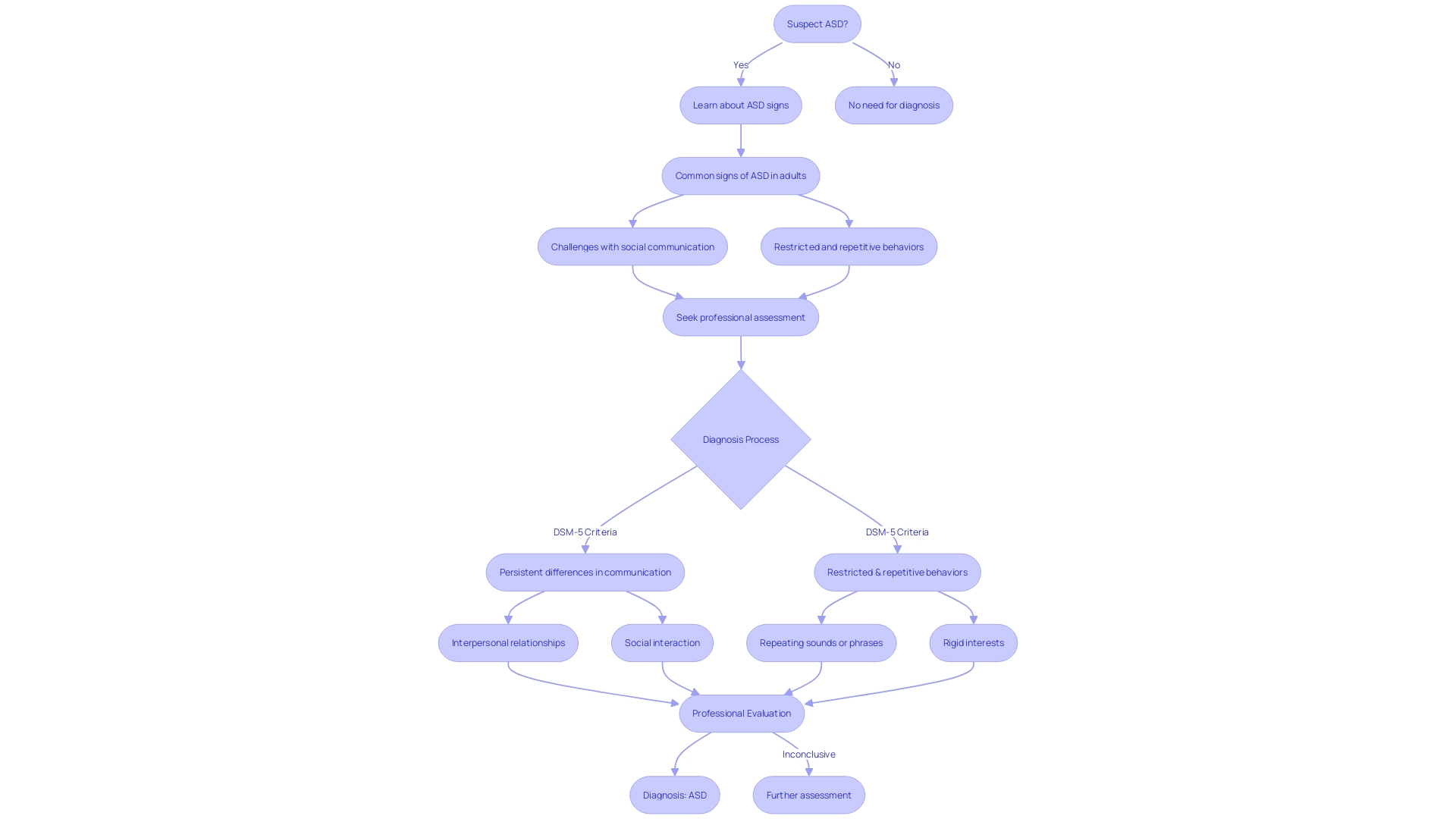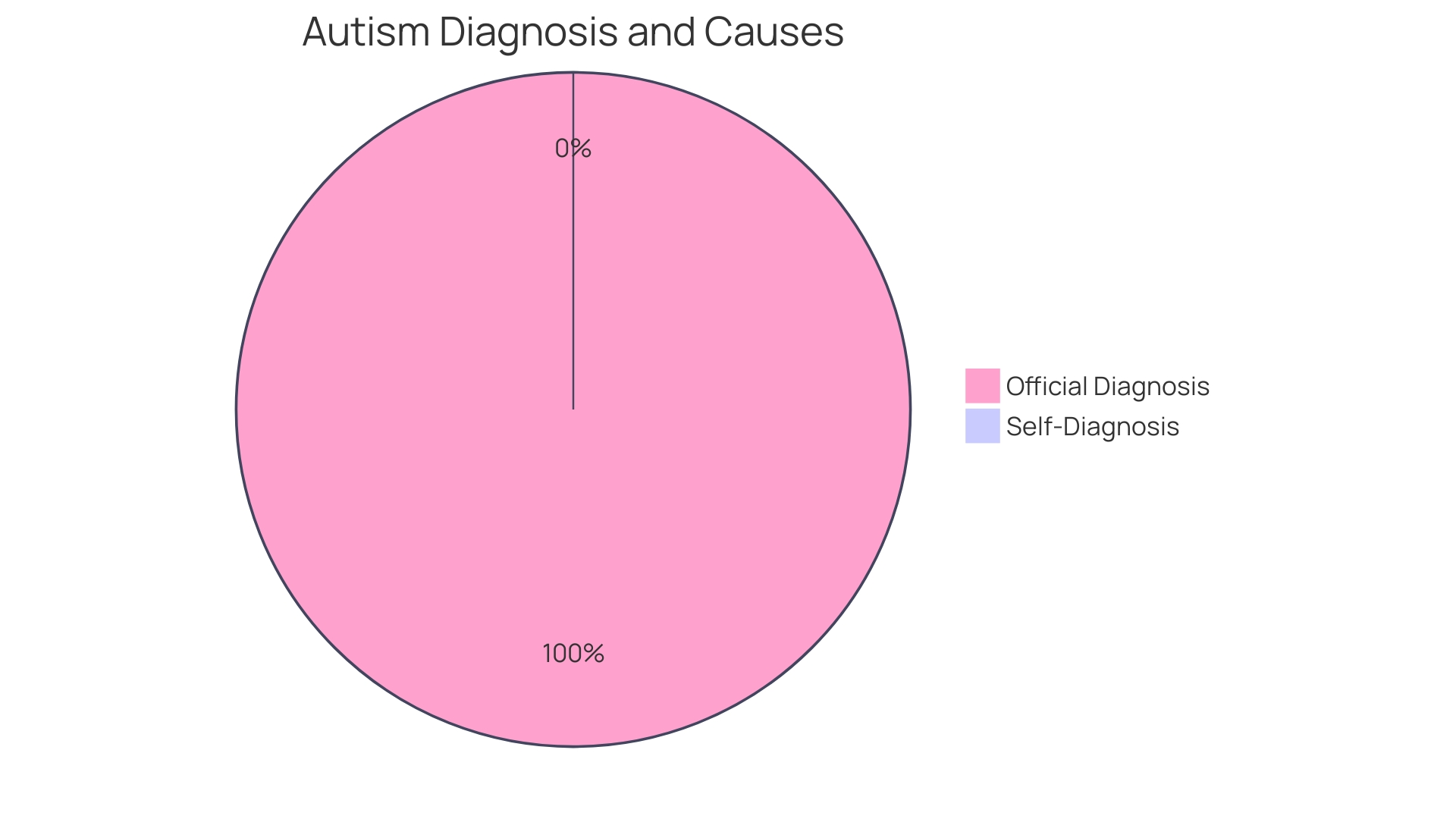Introduction
In today's world, online resources play a significant role in various aspects of our lives, including healthcare. When it comes to autism, online tests offer a convenient way to assess ASD traits initially. However, it's important to recognize their limitations.
These tests may not capture the diverse spectrum of autism symptoms and should not replace a professional diagnosis. The diagnostic process, which involves parental input and professional observation, is crucial for a comprehensive understanding of an individual's unique behavior spectrum. In this article, we will explore the limitations of online autism tests, the importance of professional diagnosis, challenges in evaluating autism in adults, and best practices for adult autism evaluation.
By understanding these aspects, we can empower ourselves as Parent Advocates to navigate challenges and ensure the well-being of our children.
Limitations of Online Autism Tests
While online autism tests offer a convenient initial evaluation of ASD traits, they are not substitutes for professional diagnosis. Such tests may overlook the diversity of autism symptoms and fail to capture an individual's unique behavior spectrum. The diagnostic process, as outlined by the DSM-5, involves both parental input and professional observation.
Notably, no single assessment tool should stand alone as a diagnostic determinant. Advanced methods such as the SenseToKnow app, which employs AI to analyze behavioral responses from videos, show promise. However, as research indicates, many adults receive inconclusive results from medical autism testing, and the community increasingly recognizes self-diagnosis.
This acknowledgment comes amid recognition that traditional testing may not fully encapsulate an individual's neurological profile. Ultimately, a thorough and culturally sensitive assessment, possibly including ADHD, OCD, or PTSD evaluations, is imperative for a comprehensive understanding and to facilitate access to tailored support and early intervention services.

Importance of Professional Diagnosis
Experts in psychology, psychiatry, and neurology are equipped with specific training to administer a thorough evaluation of adults for autism, utilizing proven diagnostic methodologies. These assessments are designed to appraise an individual's social interaction capabilities, repetitive actions, and sensitivity to sensory experiences. The significance of a professional diagnosis lies in its ability to facilitate access to targeted support and resources, enhancing one's quality of life.
While the neurodivergent community acknowledges self-diagnosis, there are compelling reasons some choose professional assessment. This includes validation against skepticism and enabling acceptance from those around them. The diagnostic journey for adults involves examining developmental history, cognitive and behavioral patterns, and analyzing self-reported data, though locating qualified evaluators can be a challenge.
The urgent need for early and precise autism diagnosis is echoed by organizations like The Autism Community in Action (TACA), which supports thousands of families. Early interventions, such as behavioral therapy, yield better outcomes, stressing the importance of timely ASD identification. Innovative approaches in diagnosis are emerging, such as NeuroQure's mission to dramatically reduce the time to diagnosis, with technologies that analyze eye movements and looking behaviors in children as young as a few weeks old, showing promise in predictive accuracy.
Despite the potential of new technologies, traditional diagnostic processes still face uncertainties. A multi-site study revealed only 70.2% of young children's diagnoses were made with high certainty. The remaining cases, especially those with subtler symptoms, often experience delayed recognition and access to essential early interventions.
Parents often notice developmental concerns early on, yet the median age of diagnosis in the U.S. lingers around 4 to 5 years, indicating a persistent gap between early concerns and formal diagnosis.
Misinformation regarding autism, particularly on platforms like TikTok, can contribute to misconceptions, with studies indicating that a substantial percentage of content is either misleading or false. This underscores the importance of reliable, professional assessments in distinguishing ASD accurately, thereby ensuring individuals receive appropriate support tailored to their needs.
Challenges in Evaluating Autism in Adults
Autism testing for adults often presents a complex challenge, due to the sophisticated coping strategies adults develop over time to manage their symptoms. These strategies can conceal autistic traits, making it harder for professionals to conduct an accurate evaluation. Unlike children, adults may exhibit autism symptoms differently, necessitating a nuanced approach to assessment.
It's crucial for professionals to recognize these differences to provide a thorough and precise diagnosis.
Understanding the intricacies of autism in adults is paramount, as self-diagnosis is commonly accepted within the autistic and neurodivergent communities. Given the limitations in the medical testing model for autism, many adults receive inconclusive outcomes. An official diagnosis may not be fundamental for everyone, especially if it doesn't impact the support required to thrive.
However, for those seeking validation or understanding from others, a formal diagnosis can underline their experiences.
Recent advancements, like the use of artificial intelligence in analyzing retina images, offer promising avenues for early autism detection. These innovative approaches could revolutionize the diagnostic process, potentially offering clearer results for those who seek them. As we strive for better healthcare for autistic adults, acknowledging the need for quality medical care is crucial, paralleling the advocacy for children with autism.
The Adult Autism Health Resources initiative at Harvard Medical School, for example, emphasizes the importance of continued support and medical care for autistic adults beyond educational milestones.
With 1 in 45 adults in the U.S. diagnosed with autism, awareness of autism's signs in adults is essential. These may include difficulties with social communication and repetitive behaviors. Recognizing these symptoms can be the first step towards identifying undiagnosed ASD in adults.
As we navigate this field, it's important to remember that while some therapeutic needs are similar across the board, autistic adults often face unique challenges that require specialized attention.
Best Practices for Adult Autism Evaluation
Professionals dedicated to the assessment of autism in adults employ a multifaceted approach to ensure evaluations are both accurate and comprehensive. This involves an intricate balance of clinical interviews that include not only the individual in question but also their family, which can provide a fuller picture of the individual's history and current functioning. Standardized assessments and questionnaires play a critical role in this process, offering a structured method to identify autistic traits and behaviors.
There is also a significant emphasis on observing behaviors across various environments to notice patterns that may not be as evident in a clinical setting alone.
Understanding that every individual's experience is unique, professionals take into account personal and familial history, as well as any cultural or demographic factors that might affect the expression of autism. This is particularly important given the diversity within the autism spectrum and the fact that autism presents differently in every individual. With one in 45 adults in the U.S. diagnosed with autism spectrum disorder, and many more potentially undiagnosed or misdiagnosed, recognizing the signs of autism in adults—such as challenges in social communication and restricted, repetitive behaviors—is crucial.
Knowledge of these signs enables a more informed evaluation.
It's important to acknowledge that while a formal diagnosis can be instrumental for many, the autistic and neurodivergent community also recognizes self-identification. This is partly due to the limitations and challenges in the medical testing model, which can sometimes yield 'inconclusive' results. Whether or not to pursue a formal diagnosis is a personal decision that may be influenced by an individual's need for official documentation or validation.
The process of diagnosing autism in adults includes assessing developmental history, cognitive and behavioral patterns, and self-reported experiences. However, barriers exist, such as finding qualified professionals who can effectively conduct evaluations in adults. The complexity of the diagnostic process, reflected in the guidelines provided by the American Psychiatric Association's Diagnostic and Statistical Manual (DSM-5), emphasizes persistent differences in communication and social interaction, as well as restricted, repetitive patterns of behavior.
Efforts by initiatives like the IACC and projects focused on improving autism care underscore the importance of ensuring autistic adults have access to quality medical care and support throughout their lives. These initiatives work toward educating clinicians and caregivers, aiming to embed autism screening and referral into routine healthcare, thus facilitating early detection and intervention. With the understanding that autism is a spectrum condition, affecting individuals differently, early diagnosis is key to providing the necessary resources and support to enable autistic individuals to thrive.

Conclusion
In conclusion, online autism tests should not replace professional diagnosis as they may not capture the full range of autism symptoms. The diagnostic process, involving parental input and professional observation, is crucial for a comprehensive understanding of an individual's behavior spectrum.
Professional diagnosis is essential as it provides access to targeted support and resources, enhancing the individual's quality of life. While self-diagnosis is recognized, professional assessment offers validation and acceptance from others.
Evaluating autism in adults presents unique challenges due to sophisticated coping strategies and varying symptom presentations. Innovative approaches, like AI analysis of retina images, show promise for early detection. The need for quality medical care for autistic adults is paramount.
Best practices for adult autism evaluation include clinical interviews, standardized assessments, and observation of behaviors in various environments. Personal and familial history, as well as cultural factors, are considered. Recognizing signs of autism in adults, such as social communication challenges and repetitive behaviors, is crucial.
While a formal diagnosis is beneficial, self-identification is also acknowledged. The diagnostic process involves assessing developmental history, cognitive and behavioral patterns, and self-reported experiences. Efforts are underway to improve autism care and ensure ongoing support for individuals throughout their lives.
Understanding the limitations of online tests, the importance of professional diagnosis, and the challenges in evaluating autism in adults empowers Parent Advocates to navigate challenges and prioritize their children's well-being. Early diagnosis plays a vital role in providing the necessary resources and support for autistic individuals to thrive.




